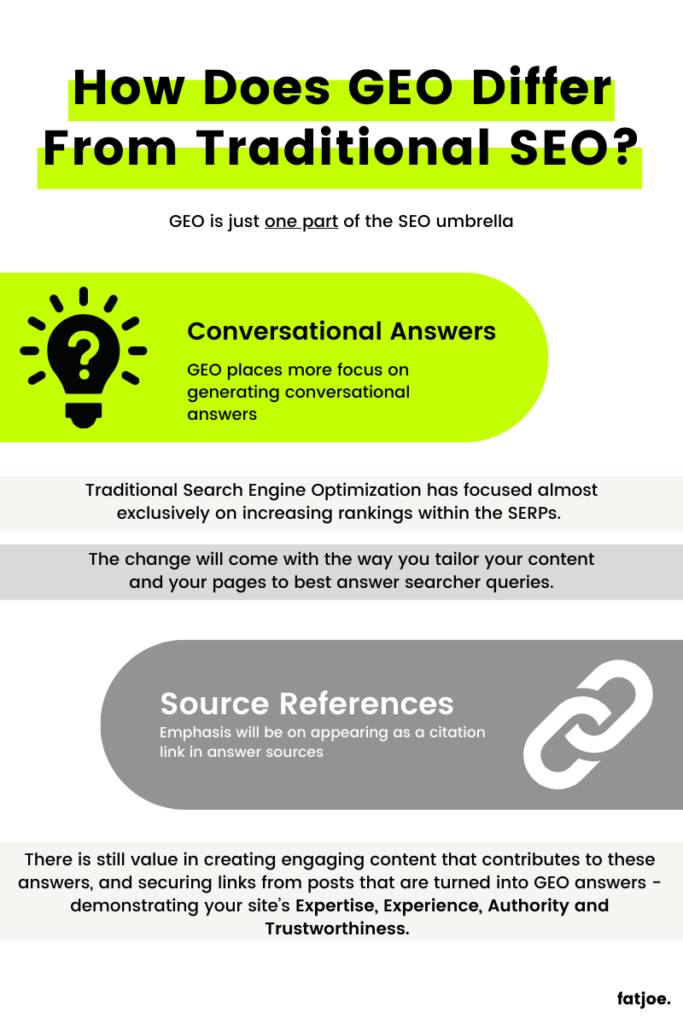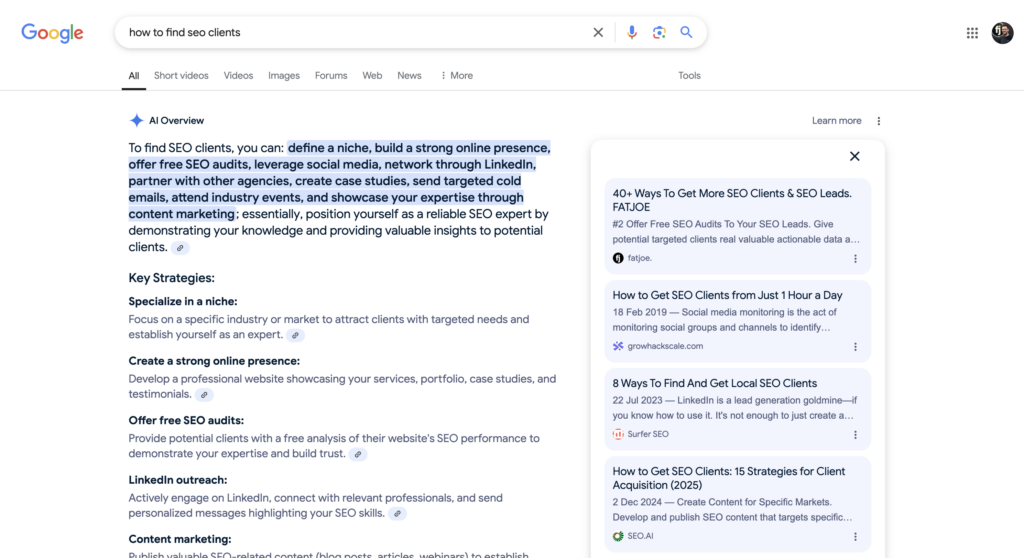It’s no secret that SEO is being fundamentally challenged by AI.
ChatGPT now has built-in search, Google serves AIOs everywhere, and that’s just scratching the surface of the impact of AI.
But users are still searching – it’s just changes to how they’re searching.
With changes to search come changes to search engine optimization.
Some are asking if SEO needs to change and even if it can survive at all.
Check out our video below, where we dive deep on whether AI will kill SEO, while this article will discuss:
- The future of SEO
- Whether Generative Engine Optimization (GEO) will replace SEO
- What happened to Answer Engine Optimization
What Is Generative Engine Optimization (GEO) Currently?
While the acceleration of AI integration in search engines has sparked interest in the topic of Generative Engine Optimization, it isn’t actually a new concept.
We first wrote this article about Answer Engine Optimization (AEO), which has been a subset of SEO ever since the rise of voice search, appearing as a term from around 2018 onwards. It has historically focused on creating content that gives specific answers to searchers’ exact queries.
Voice search and voice assistants offered a new way to search. Those engaging with voice assistants tended to ask specific, answer-driven queries. Rather than researching topics themselves, they asked directly for a singular answer.
A typical search engine query might be “bookshops near me” while a voice search would have more direct intent, such as “what time is fatjoe books open until?” The typical search engine query would include the opening times as part of the overall info delivered, but with reduced results, the user has to directly ask the question to ensure they get the most useful answer.
These searches are conversational, mirroring the fundamental change in search behavior that we’re now seeing via AI chat like ChatGPT, Perplexity, and more.
So, What Actually Is Generative Engine Optimization?
Generative Engine Optimization (GEO) is the practice of optimizing your content and website to be featured in conversational AI responses from chatbots like ChatGPT, and also to be included in SERP features like AIOs (AI overviews) in Google.
AI chatbots are attempting to aggregate search results into their own unique answers to searchers’ queries, bypassing the possibility of even displaying webpages in the results, let alone driving clicks for those pages.
Expanding On GEO: Beyond Just Answering
GEO takes traditional Answer Engine Optimization a step further by considering the way AI models aggregate and synthesize information. While AEO was primarily about providing a direct answer, GEO requires you to think about context, nuance, and the conversational tone that AI systems favor.
The rise of these technologies means that content must be accurate and structured in a way that fits the AI’s narrative/conversational style—making it more “readable” for both bots and end users.

How Is Generative Engine Optimization (GEO) Different To SEO?
The quick answer is that it isn’t that much different, really.
The general objective is the same: to promote your website’s visibility in search responses, attracting more traffic and awareness for your site and brand.
What’s different is how that plays out and what the direct measurables are.
Zero-Click Searches: More Than Just Reduced Traffic
Okay, to declare AI search completely zero-click is over-much.
We at fatjoe are seeing some great upturns in chatbot referrals directly as a result of us being mentioned as a great option in AI queries or having our blog posts and pages cited by AI results.
But those clicks are drastically reduced compared to the old days of SEO and 10 blue links in Google.
For informational queries, users can ask chatbots for complex, multi-layered answers and never need to leave the platform.
Sure, your content might be cited as part of that answer, but unless the user is very keen on digging deeper on the topic or citing their sources, that’s it.
No clicks and no visibility that you were even mentioned.
The same goes for AI overviews (AIOs) delivered directly in the SERPs.

Sure, we’ve been cited here (go us!) but unless a searcher is particularly keen on going deeper into the topic it’s unlikely we’ll actually see a click from it.
Beyond Clicks: The New SEO Metrics
In this “evolving landscape” as AI would love to call it, the value of SEO can no longer be measured solely by click-through rates. Engagement metrics such as brand recall, time spent on a page after a direct referral from an AI response, and even social shares become critical.
GEO shifts the focus from just driving traffic to ensuring that your brand is recognized as a reliable source of information in the aggregated AI response. This shift creates a new kind of competition – one where visibility in AI-generated answers can lead to significant brand authority, even without a click.
So, Is SEO Pointless In A World Of AI?
Right, so if we’re not getting clicks from these answers, is there any point chasing these mentions?
ABSOLUTELY.
There may be fewer clicks than ever before going through to sites, but that makes them more important. You’re in a closer fight with your competitors than you’ve ever been, scrapping for less and less SERP real estate and less organic visibility.
Where it’s on offer, you have to be poised to capitalize on the opportunity to be discovered by potential new clients and to outcompete your competitors.
The Hidden Benefits of GEO
Even if the direct click metrics seem lower, being featured in AI responses amplifies your brand’s authority and reach. When users see your content aggregated into a trusted AI answer, it builds brand credibility and often sparks curiosity that leads to deeper engagement elsewhere – like social media interactions or direct searches for your brand.
How To Do SEO And GEO
The great thing is that the practice of GEO is remarkably similar to SEO.
You still need to rely on powerful links and great content.
The major change is the power of brand above all else.
AI responses work on data aggregation, compiling external sources to deliver an answer it thinks fits the searcher’s query.
When a chatbot looks to answer the question “who should I use for link building for SEO” how does it come up with that answer?
- By compiling a mix of all of the articles promising to deliver the “Best link builders for 2025” and aggregating who is mentioned the most.
- By trawling their databases and training sets to see which brand entities they have the greatest awareness of and bringing the two lists together to deliver answers to their users.
- By contextually assessing what sites talk about to determine their authority to provide an answer on a given topic, then using their content as part of the AI-generated answer.
So, how do we demonstrate and deliver these things with our sites?
Traditional SEO Techniques Still Apply – And Here’s How to Expand Them For GEO:
Quality Content Creation:
- Conversational Tone: Write as if you’re answering a question in a conversation. Think about long-tail, question-based queries that users might ask an AI.
- Structured Data: Use schema markup (there’s debate about this but it’s still great to use anyway), FAQs, and Q&A formats to clearly outline answers within your content. This helps AI extract the most relevant parts.
Powerful Links and Digital PR:
- Laser-Focused Link Building: Inclusion in top X lists and roundups comes through targeted link building. Earn high-quality backlinks by offering valuable insights.
- Brand Mentions: Focus on digital PR efforts that build your brand’s authority. Get featured in industry roundups, interviews, and expert panels, so AI training data recognizes your brand.
Building E-E-A-T (Expertise, Experience, Authority, and Trust):
- Authoritative Content: Demonstrate expertise through in-depth guides, case studies, and original research.
- User Experience: Ensure your website is fast, secure, and user-friendly, reinforcing the trust factor.
Entity Building and Contextual Relevance:
- Focus on Relevance: Develop content that strongly ties your brand to the topics you want to be known for. Use internal linking strategies to create content clusters around key topics.
- Multimedia Integration: Enhance text with videos, infographics, and interactive elements to provide varied formats that AI can also reference.
Monitoring and Adapting:
- Use AI Analytics Tools: Leverage AI-driven analytics to understand which pieces of content are being picked up by generative engines.
- Track AI referrals – it doesn’t have to be complex, you can set up simple Looker templates that track AI referrals in GA4
- Iterate Based on Data: Regularly update your content based on performance insights and evolving AI algorithms to remain competitive.
GEO is still very much in its infancy and there’s no hard and fast answer or a defined playbook for GEO optimization – all we know is it contains elements of traditional SEO, but we’re still deciphering the ‘secret sauce’ additions needed to really catapult GEO to the fore.
How to optimize for generative AI? No one really knows. Our guide on optimizing Generative AI vs SEO hopes to get you “grounded” in our understanding of the nuances & differences between visibility in search engines and visibility in AI “engines”https://t.co/1ehi1etoqk pic.twitter.com/WxKnlqbqjB
— Wil Reynolds (@wilreynolds) January 24, 2025
The Future of Generative Engine Optimization, Answer Engine Optimization, And SEO
Whatever you call it, Generative Engine Optimization or Answer Engine Optimization, it will continue to develop in the coming years and become a larger subset of overall SEO efforts.
It shouldn’t be considered a replacement for SEO but rather a complement to it, building on traditional SEO foundations.
As AI continues to evolve, GEO will further blur the lines between traditional search results and AI-generated answers. Brands that master both traditional SEO and GEO will not only capture organic clicks but will also secure their place as trusted authorities in AI-driven responses. By adapting to these changes now, you can ensure that your digital presence remains robust, relevant, and competitive.
Stick with us as we chart the rise of AI in search and keep nailing those SEO basics of great content and amazing links – now with the added edge of GEO.
Become a Pro at SEO
Join 65,000 others and learn the secrets to SEO success with our weekly blog posts.
